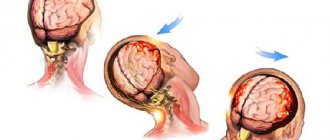Psychological trauma is a broad concept that is used in modern psychology and psychotherapy. Trauma occurs as a result of stress that is excessive for the psyche. The result of psychological trauma is the emergence of various pathological conditions, including depressive and anxious ones.
The patient feels helpless: he no longer feels safe, there is a feeling that he can no longer control his life and be confident in the future. Both psychological and physical (somatic) symptoms may occur. Psychological ones include tension, anxiety, obsessive thoughts about what happened, which are difficult to get rid of, tearfulness, apathy, desire for solitude or, on the contrary, fear of being alone, and others. Psychological symptoms vary greatly depending on personality type and manifest differently in different patients.
If the patient has a tendency to psychosomatic disorders or somatization, somatic symptoms are added: tremor, chronic fatigue, insomnia, discomfort in the heart, shortness of breath, coldness or numbness of the extremities, unsteadiness of gait, “lump in the throat,” abdominal pain and others.
Modern psychotherapy offers complete and high-quality treatment of such pathological conditions. All you need to restore your psyche is to consult a specialist and undergo a full course of treatment.
At CELT you can get advice from a psychiatrist.
- Appointment with a psychiatrist with an extended interview, psychotherapy session - 4,500
Make an appointment
It is important to remember that a traumatized psyche is very fragile, and, therefore, only a specialist can solve psycho-emotional problems. Dealing with trauma on your own increases the risk of retraumatization as a result of constant reminders of the circumstances of the trauma.
Causes, prerequisites and risk factors
It is generally accepted that psychological trauma always happens suddenly. It occurs at a moment when a person is completely unprepared for a shocking event. However, this is not entirely true - it would seem that the relatives of a patient suffering from cancer knew about the advanced pathological process, knew about the stage of the disease and that the doctors did everything they could. However, after their loved one passes away, they may experience a bereavement reaction similar to that of someone who has lost their loved one suddenly, such as in a car accident.
There are conditions that lead to psychological trauma with a high degree of probability:
- The traumatic event happened unexpectedly, nothing indicated such a development of events.
- There was no way to prevent the traumatic event. Or there was such an opportunity, but the patient did not take advantage of it.
- The event was marked by cruelty or injustice.
- There are prerequisites from childhood: the same traumatic event happened many years ago and was not worked through with a specialist.
- The person had an ambiguous relationship with the victim (for example, frequent quarrels or feelings of guilt).
Psychological trauma can be anything - loss, an episode of violence, an accident, an illness, a severe danger to life and health. A traumatic episode can happen to the patient himself, to his relatives or friends, or in front of his eyes.
Long-term negative effects on the psyche can also cause psychological trauma - for example, living in a family with frequent episodes of violence, proximity to criminals or inappropriate people, or a long-term illness. For “sensitive” people with a labile psyche, even a seemingly ordinary event can in some cases lead to trauma, which in such cases is called “adjustment disorder”, but, nevertheless, requires the help of a specialist. Such reasons may be moving to a new city, changing jobs with increased workload and growing demands and competition; even such a joyful event as the appearance of a child in the family (even a beloved and long-awaited one!) can serve as a “trigger” for the development of adaptation disorder.
The most common events that lead to psychological trauma are:
- Domestic injuries, sports injuries.
- Previous surgical operations, especially if the intervention occurred in childhood.
- Death of a loved one.
- Man-made and man-made disasters. Car accidents, plane crashes.
- A breakup in a relationship that meant a lot.
- A humiliating experience, severe disappointment in yourself or others.
You need to understand that the above situations will not lead to psychological trauma for all people. There are some risk factors that increase vulnerability to emotional distress. For some people, a seemingly insignificant event can lead to injury, while others easily tolerate even a long stay in a traumatic environment.
An increased risk is observed in people who are under constant stress. Also at risk are people with childhood traumas, and anyone who has suffered from episodes of depression or anxiety disorder. In such people it is easy to provoke psychological trauma and even easier – re-traumatization. Some patients who are diagnosed with “psychotrauma” have in the past shown a certain predisposition to overreacting - an innate “vulnerability to stress,” otherwise called “emotional lability” by specialists.
How to get rid of psychotrauma
Mental trauma is not just a section of study in psychology and psychotherapy. This is a serious disorder that affects a person's life. Doctors are involved in treatment, since it is impossible to get rid of such deviations on your own.
If psychological trauma can be overcome on your own, then mental changes are corrected by specialists. The latter are treated with therapy and medication.
Treatment with drugs and procedures is prescribed only by a doctor after a concomitant diagnosis has been established. For example, advanced cases of deep clinical depression are treated with special medications that will harm a healthy person.
It is not always easy to independently identify the moment when psychological trauma was transformed into mental trauma. It’s good when there are close people who can track changes in behavior dictated by mental disorders.
Symptoms and signs
Different people react differently to emotional pressure. Therefore, there is no single true and correct reaction to stress. The clinical picture varies greatly depending on the circumstances of the injury and the personal characteristics of the patient.
It is important to understand that there is no single correct reaction; all unpleasant emotions that arise after an injury are normal, this is the body’s individual response to stress.
The following symptoms are identified in the emotional sphere:
- Loss of faith in yourself or in the justice of the world around you.
- Shock and rejection.
- Attempts to isolate yourself from others.
- Rage, anger, irritation.
- Unmotivated mood swings.
- Feelings of guilt, shame, an attempt to take the blame upon yourself.
- Confusion.
- Decreased cognitive function, inattention, impaired concentration.
- Unmotivated fear and anxiety.
Psychological trauma also has physical manifestations:
- Insomnia, sleep disturbance. Frequent nightmares. Increased drowsiness is possible.
- Rapid heartbeat, discomfort in the heart area.
- Pain of varying intensity and localization, not associated with existing somatic diseases.
- Chronic fatigue, fatigue even from light activities.
- Constant tension in the muscles.
- Tremor, sloppiness, lack of coordination.
All these symptoms last from several days to several months. They gradually subside as the trauma is worked through. The thing about emotional trauma is that even when everything seems to have passed, unpleasant memories can resurface and cause retraumatization.
It is important for patients and their loved ones to understand that grief is a natural reaction to psychological trauma. You need to allow yourself to experience unpleasant feelings and stop blaming yourself. The same needs to be done for your loved ones; the support of others is very important during treatment.
Factors of psychotrauma
The general characteristics of mental trauma say that their formation is influenced by various factors. The main ones:
- Age.
- Floor.
- Social status.
- Neuropsychic state.
- Family status.
- Personal characteristics.
Simply put, a mentally tired person is more susceptible to stress and anxiety than a calm individual with a stable psyche.
No less important factors are gender, age and marital status. For example, the same event has different effects on a woman who has a stable job and a happy family and on a lonely girl without a regular income who is desperate to find love. Let's say a friend told me about buying an apartment. A woman whose emotions are in harmony will sincerely rejoice and wish you success in finding suitable housing. A desperate, lonely girl will feel jealous and dig deeper into her problems, feeling like a worthless loser.
Reasons to see a doctor
Recovery may take some time. The amount of time is individual and depends only on the personal characteristics of the patient. There are cases in which you cannot cope without the help of a specialist. These include:
- Unpleasant sensations do not go away for several months, negative emotions do not subside over time.
- Emotional depression affects work and family relationships.
- There is a fear of intimacy, which causes relationships with others to collapse.
- Physical symptoms are observed.
- An avoidance reaction is observed: the patient consciously or unconsciously avoids activities and situations that are reminiscent of the events of trauma.
- The patient uses alcohol, smoking or drugs to get rid of oppressive emotions.
During the treatment process, the specialist suggests confronting the trauma events again and finally working through them. Treatment takes some time. Unfortunately, you cannot get rid of unpleasant sensations by “willpower” alone. Only time and work with a specialist will help. Therapy takes place in several stages:
- Processing traumatic memories, feelings, emotions.
- Working through physical symptoms, learning to control the physical reaction to stress.
- Emotional control training.
- In some cases, it is necessary to include psychopharmacotherapy. In this case, mild, “gentle” drugs are prescribed that do not have a negative effect on everyday functioning and do not reduce performance, to which “addiction” does not form and does not develop “dependence syndrome”. Our specialists will discuss in detail with the patient all possible undesirable effects that may arise and will take into account the individual characteristics and preferences of the patient.
The key to successful therapy is time and completion of the full course of recommended treatment. The CELT clinic employs the best psychotherapists who will help you overcome any psychological problems. Attention and concern for each patient became the key to recovery for hundreds of happy visitors to the clinic.
Make an appointment through the application or by calling +7 +7 We work every day:
- Monday—Friday: 8.00—20.00
- Saturday: 8.00–18.00
- Sunday is a day off
The nearest metro and MCC stations to the clinic:
- Highway of Enthusiasts or Perovo
- Partisan
- Enthusiast Highway
Driving directions
Relationship trauma
The most common situation of relationship trauma is divorce or breakup. Accompanied by anger and disappointment . “I hoped that I would be happy with him for 100 years, but he (she) took advantage of me and ran away to someone else. And I’m like a depositor in a bank that burst, I invested, I invested, but I didn’t get anything.” The disappointment is strong, and may be accompanied by the decision: “That’s it! I won't trust anyone again! I won’t open my heart to anyone again!” Or it may be accompanied by a demand to the therapist as an omnipotent wizard: “Give me my husband back!”
What can be done about this situation in the constellation? It is possible to react with anger. Can look for reasons to justify each other : look, you were loaded with this, your partner – with this, that’s why you couldn’t be together. It’s not anyone’s fault, but a misfortune.” In practice, I had a case when the kindergarten situation influenced the sexual relationship between husband and wife. If you eliminate negative programs and do it symmetrically for both partners, and also learn to discuss problems together, in a respectful dialogue, a lot can be restored. This is a joint effort, and the therapist is there to help you.
The idea that any relationship is symmetrical and reciprocal is very productive. A suicidal person cannot enter into a long-term happy relationship with a lover of life and an optimist, free from negative programs. If two people come together, it means that the structure of their internal programs allows this union. One gear must fit another gear. And if only one of the couple is treated, this can strengthen the asymmetry, and can lead to a final break in the relationship. One - freed - ran to conquer the heights of success, while the other remained with his load in the pit. Therefore, if there is a desire to restore the relationship, it is very important to agree on parallel or simultaneous therapy for both partners.
If restoring the previous relationship is impossible, you need to work on attracting the client to a new partner and creating new relationships. The goal in such work may be a new state : “ I am an attractive man (I am an attractive woman).” Let me give you an example. A woman turned to me. When shaking hands, the hand is like a herring - wet and cold. Zero energy. The big question is how she even walks and breathes. Request: “My husband left for his mistress. Help". For obvious reasons, there was no joint parallel work. We had work to increase our personal attractiveness resource. After several months of work and a series of constellations, the man returned home. By this time, this woman's handshake had become very warm, soft and energetic. And the energy level rose to 100%. Thus, one of the most important tasks of the constellator and therapist is to switch the client from the request “Give me back my husband (partner)” to the request “How to become the most attractive.”
Another very important aspect in working with relationship trauma. No guarantees can be given in this area. All the work is done by the client himself . The therapist is simply his assistant, a guide, an expert in using various tools for change. It is true that a person will have more resources. But whether to restore old relationships or look for new ones is up to the client to decide.
Thus, when working with relationship trauma, you have to work a lot to form a positive image of yourself: “I am good.” And let’s say we sorted out all the old disappointments and relationships, separated from previous husbands and lovers, so that the person becomes free for new relationships. And it seems that the person has become free for new relationships. And he lacks basic behavioral skills. He doesn’t know how to make acquaintances, communicate, kiss, invite people to dance, or courtship. What to do? There is a huge layer of behavioral therapy here, this is a long period of training and doing homework until the result is achieved. Systemic therapy and behavioral training are two sides of the coin. One must be accompanied by the other.
Another example from practice. One of the female clients complained about the lack of attention from men, and she herself posted photos of herself in a swimsuit on the Internet. In the arrangement, it turns out that the viewers of her photographs are 60-year-old men and, attention! - their wives. In essence, they had virtual sex with her, taking away her energy for a real relationship. In this case, there is only one recommendation - remove photos from the Internet and seduce men, build relationships with them in real life, one on one.
How to survive psychological trauma?
Whatever the cause of the state of excessive melancholy and hopelessness, help should not be neglected. A person definitely needs to understand the reasons for his condition and come to a deep understanding of this difficult period. How to survive psychological trauma? Let's take a closer look.
Acceptance of feelings
A person must necessarily go through the stage of grief. Usually at this moment all his senses are heightened to the limit. Emotional experiences burst forth; any careless phrase can cause a whole storm of indignation and lead to a state of despair. But experiencing grief is a necessary stage preceding complete emotional recovery. You can't run away from these feelings, you can't hide anywhere. On the contrary, you need to try to live this period as fully as possible so that the mental wound begins to gradually heal. This is the only way to free yourself from endless worries and suffering.
Support
It is best if truly close people are nearby during moments of prolonged stress. Their healing influence is enormous: a feeling of self-need and importance comes, internal strength appears in order to live and act, and not give up at the first failures. When living through trauma, you cannot isolate yourself from people. On the contrary, you need to try to open up to the world as fully as possible in order to feel support with all the strength of your soul. And she will definitely come! You just need to be able to accept it.
Thus, psychological trauma is a problem that definitely needs to be addressed. You can’t just brush aside your own fears and doubts. Any experiences need correction, and a person must receive qualified help in a timely manner. If an individual feels that his state of hopelessness is crossing all boundaries, then he needs to make an appointment with a specialist as soon as possible. Psychologist Irakli Pozharisky will help with this issue. Working with a professional will bring tangible benefits: anxiety and fear of life will go away, a desire to act and achieve your goal will appear.











